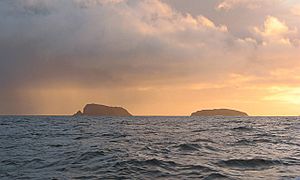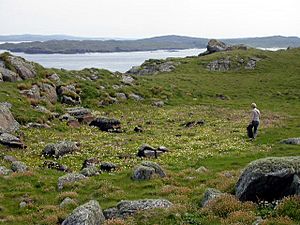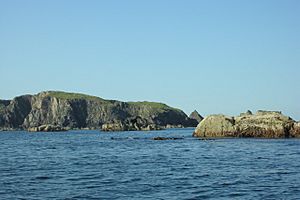Bearasaigh facts for kids
| Gaelic name | Bearasaigh |
|---|---|
| Norse name | bergs-ey |
| Meaning of name | precipice isle |
| OS grid reference | NB121425 |
| Coordinates | 58°16′N 6°55′W / 58.27°N 6.91°W |
| Physical geography | |
| Island group | Outer Hebrides |
| Area | <10 ha |
| Highest elevation | 58 metres (190 ft) |
| Administration | |
| Sovereign state | United Kingdom |
| Country | Scotland |
| Council area | Comhairle nan Eilean Siar |
Bearasaigh (also spelled Bearasay or Berisay) is a small island in the outer Loch Ròg, near Lewis in Scotland. This tiny island has a big history! In the late 1500s and early 1600s, it was a secret hideout for pirates. Today, its tall cliffs are a popular spot for rock climbing.
Contents
What is Bearasaigh?
Bearasaigh is located northwest of Great Bernera, Little Bernera, and Flodaigh. It is south of Seanna Chnoc. The island has steep sides but a fairly flat top. Just to its west is Stac an Tùill, a tall sea stack. There is also a sea cave on the northeast side. The water channel between Bearasaigh and Seanna Chnoc can be tricky. It gets rough when the wind blows against the ocean tide.
A Pirate's Secret Hideout
In the 16th century, Bearasaigh became a hideout for Neil MacLeod. He was a local leader from the MacLeods of Lewis clan. In 1598, King James VI of Scotland wanted to control the Isle of Lewis. He sent a group called the "Gentleman Adventurers" from Fife to take over. They also wanted to control the local fishing.
Neil MacLeod, along with his brother Murdoch and his nephews, fought back. They drove the king's men away. MacLeod and about 40 of his followers then lived on Bearasaigh for three years. They used the island as a safe place, avoiding the powerful MacKenzie clan who supported the king.
The Pirate Ship
While MacLeod was on Bearasaigh, an English pirate named Peter Love sailed into Loch Ròg. His ship, the Priam, was full of stolen goods. This included valuable items like cinnamon, ginger, pepper, cochineal, and sugar. He also had 700 animal hides and 29 pieces of silver. From a Dutch ship, he had a box of precious stones. Plus, he had many muskets.
Love and MacLeod made a deal to work together. They captured many ships and took their cargo. One ship belonged to Thomas Fleming. They held him prisoner. They also captured a Flemish ship. This ship later crashed in Shetland due to bad weather.
A Tricky Betrayal
However, Neil MacLeod betrayed Peter Love. During a big meal, MacLeod tried to capture the pirates. Some pirates were killed in a fight. But MacLeod and his men managed to capture Love and the Priam.
This capture helped MacLeod. It gave him money and a way to make peace with the Scottish Government. Love and nine of his men were given to the authorities in December 1610. They were put on trial in Edinburgh and later executed.
Neil MacLeod's Fate
Neil MacLeod's freedom didn't last much longer. In 1613, he was forced to leave Bearasaigh. He fled to Harris to seek protection from his relative, Rory Mor MacLeod. Neil hoped King James VI would pardon him. But when they reached Glasgow, Rory Mor MacLeod handed Neil over to the authorities. Neil MacLeod was found guilty of betraying the king. He was executed in April 1613. His son, Donald, was sent away to England.
What Remains Today?
The ruins of the buildings used by Neil MacLeod and his followers can still be seen. They are in the southwestern part of the island. There are five structures, one of which is shaped like a "T".
Fun Activities on Bearasaigh
The Norse people called Bearasaigh "precipice isle" because of its steep cliffs. This makes it a great place for rock climbers! They have found many climbing routes on Bearasaigh's cliffs. Some routes are called "Hadrians Wall," "Pictland," and "Weathermans Geodha."
There's also a climb called "Ask not for whom the Bell Tuills." This one is on Stac an Tuill, a 50-metre (160 ft) sea stack. To get to it, a swimmer has to set up special ropes called Tyrolean traverses.
Bearasaigh is also a destination for experienced sea kayakers. They enjoy paddling around the island and exploring its coastline.
 | Georgia Louise Harris Brown |
 | Julian Abele |
 | Norma Merrick Sklarek |
 | William Sidney Pittman |




